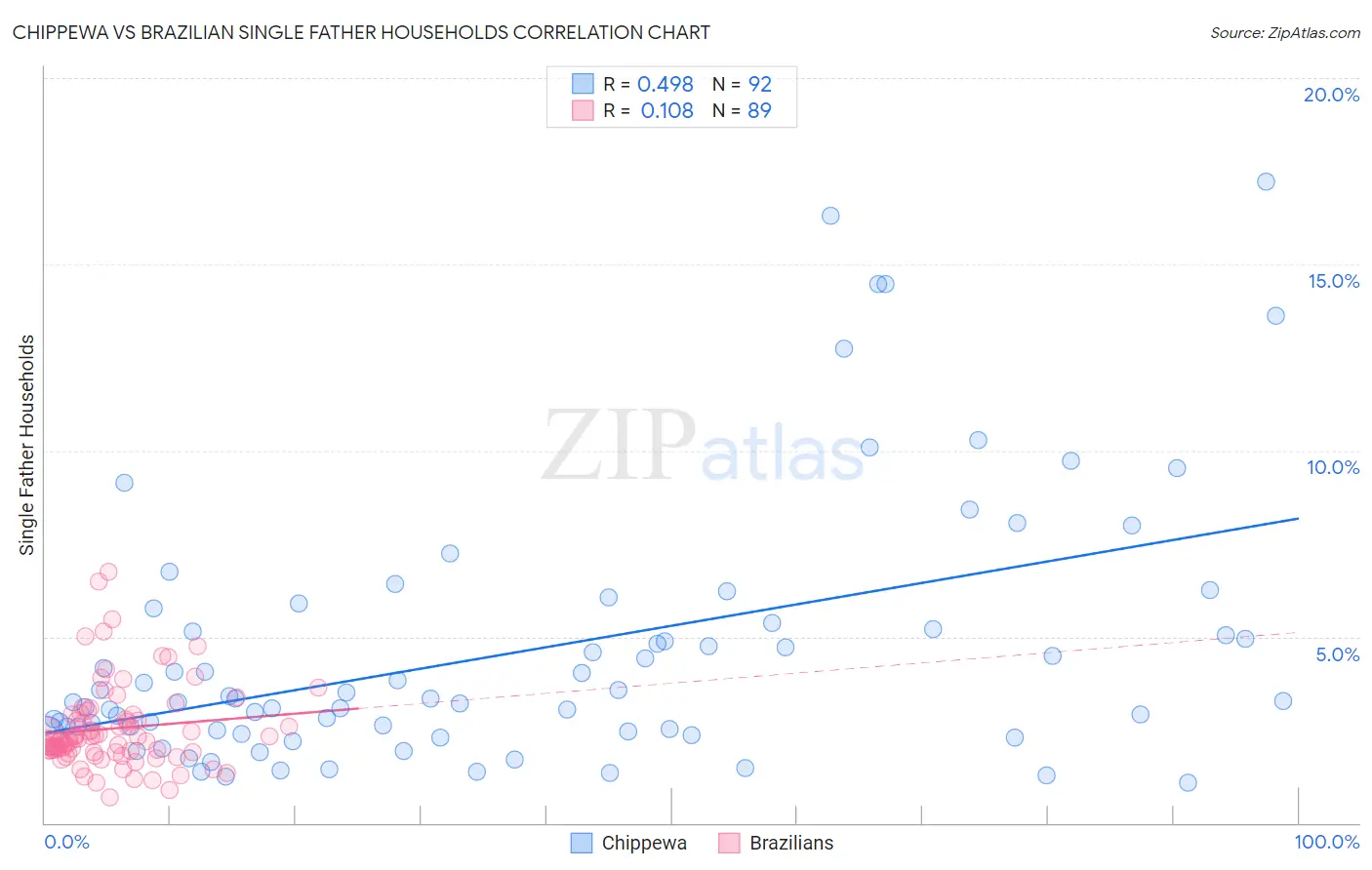Chippewa vs Brazilian Single Father Households
COMPARE
Chippewa
Brazilian
Single Father Households
Single Father Households Comparison
Chippewa
Brazilians
3.1%
SINGLE FATHER HOUSEHOLDS
0.0/ 100
METRIC RATING
329th/ 347
METRIC RANK
2.2%
SINGLE FATHER HOUSEHOLDS
92.8/ 100
METRIC RATING
139th/ 347
METRIC RANK
Chippewa vs Brazilian Single Father Households Correlation Chart
The statistical analysis conducted on geographies consisting of 214,030,064 people shows a moderate positive correlation between the proportion of Chippewa and percentage of single father households in the United States with a correlation coefficient (R) of 0.498 and weighted average of 3.1%. Similarly, the statistical analysis conducted on geographies consisting of 321,679,292 people shows a poor positive correlation between the proportion of Brazilians and percentage of single father households in the United States with a correlation coefficient (R) of 0.108 and weighted average of 2.2%, a difference of 38.7%.

Single Father Households Correlation Summary
| Measurement | Chippewa | Brazilian |
| Minimum | 1.1% | 0.67% |
| Maximum | 17.2% | 6.7% |
| Range | 16.1% | 6.1% |
| Mean | 4.6% | 2.5% |
| Median | 3.3% | 2.2% |
| Interquartile 25% (IQ1) | 2.5% | 1.9% |
| Interquartile 75% (IQ3) | 5.3% | 2.9% |
| Interquartile Range (IQR) | 2.8% | 1.0% |
| Standard Deviation (Sample) | 3.5% | 1.1% |
| Standard Deviation (Population) | 3.5% | 1.1% |
Similar Demographics by Single Father Households
Demographics Similar to Chippewa by Single Father Households
In terms of single father households, the demographic groups most similar to Chippewa are Immigrants from Cabo Verde (3.1%, a difference of 0.10%), Bangladeshi (3.1%, a difference of 0.65%), Nepalese (3.1%, a difference of 0.88%), Aleut (3.0%, a difference of 1.5%), and Immigrants from Mexico (3.0%, a difference of 1.7%).
| Demographics | Rating | Rank | Single Father Households |
| Immigrants | Guatemala | 0.0 /100 | #322 | Tragic 3.0% |
| Immigrants | Central America | 0.0 /100 | #323 | Tragic 3.0% |
| Fijians | 0.0 /100 | #324 | Tragic 3.0% |
| Immigrants | Mexico | 0.0 /100 | #325 | Tragic 3.0% |
| Aleuts | 0.0 /100 | #326 | Tragic 3.0% |
| Bangladeshis | 0.0 /100 | #327 | Tragic 3.1% |
| Immigrants | Cabo Verde | 0.0 /100 | #328 | Tragic 3.1% |
| Chippewa | 0.0 /100 | #329 | Tragic 3.1% |
| Nepalese | 0.0 /100 | #330 | Tragic 3.1% |
| Navajo | 0.0 /100 | #331 | Tragic 3.2% |
| Yaqui | 0.0 /100 | #332 | Tragic 3.2% |
| Natives/Alaskans | 0.0 /100 | #333 | Tragic 3.2% |
| Yuman | 0.0 /100 | #334 | Tragic 3.3% |
| Colville | 0.0 /100 | #335 | Tragic 3.3% |
| Paiute | 0.0 /100 | #336 | Tragic 3.3% |
Demographics Similar to Brazilians by Single Father Households
In terms of single father households, the demographic groups most similar to Brazilians are British (2.2%, a difference of 0.010%), Laotian (2.2%, a difference of 0.090%), Luxembourger (2.2%, a difference of 0.13%), Immigrants from Nepal (2.2%, a difference of 0.19%), and West Indian (2.2%, a difference of 0.42%).
| Demographics | Rating | Rank | Single Father Households |
| Poles | 96.5 /100 | #132 | Exceptional 2.2% |
| Taiwanese | 96.3 /100 | #133 | Exceptional 2.2% |
| Zimbabweans | 95.1 /100 | #134 | Exceptional 2.2% |
| Syrians | 94.8 /100 | #135 | Exceptional 2.2% |
| Chileans | 94.5 /100 | #136 | Exceptional 2.2% |
| Austrians | 94.2 /100 | #137 | Exceptional 2.2% |
| West Indians | 94.1 /100 | #138 | Exceptional 2.2% |
| Brazilians | 92.8 /100 | #139 | Exceptional 2.2% |
| British | 92.8 /100 | #140 | Exceptional 2.2% |
| Laotians | 92.5 /100 | #141 | Exceptional 2.2% |
| Luxembourgers | 92.3 /100 | #142 | Exceptional 2.2% |
| Immigrants | Nepal | 92.1 /100 | #143 | Exceptional 2.2% |
| Slovaks | 90.7 /100 | #144 | Exceptional 2.2% |
| Immigrants | Zimbabwe | 90.2 /100 | #145 | Exceptional 2.2% |
| Northern Europeans | 89.8 /100 | #146 | Excellent 2.2% |